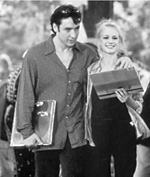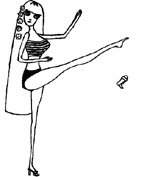PEOPLE GO CRAZY when they turn 30. That rite of passage can inspire some remarkably inexplicable behavior, even in the sanest individuals. My mom sobbed in the middle of her birthday cake. A college friend finally started his first band, proud to be rid of his twenty-something fear of failure. But the best story I know is how this one guy called all the girls he’d been afraid to ask out and posed this question: “If I’d have had the balls to ask you out, would you have said yes?” To his surprise (and dismay), many of his secret former crushes replied in the affirmative. If he hadn’t been so paralyzed by a distorted view of his lovability, he could’ve dated twice as many chicks.
HIGH FIDELITY
directed by Stephen Frears
with John Cusack, Iben Hjejle, and Joan Cusack
opens March 31 at Harvard Exit, Metro
So when you see John Cusack’s incarnation of the modern relationship-bumbling 30-year-old, know that he’s not just a shallow older John Hughes-style protagonist. It really is possible to be this lost this late in the game, and that’s why it’s so easy to guffaw at 95 percent of the characters in High Fidelity. Stop laughing, however, and you just might see the cold hard parallels of loneliness and poverty on a personal level.
As the movie opens, record store owner Rob Gordon (Cusack) is being dumped by his live-in attorney girlfriend Laura (Danish actress Iben Hjejle of Mifune, whose wooden accent sometimes gives her an air of awkward insincerity). In his dumpy apartment strewn with remarkable indie rock cred—including concert posters from shows that actually happened and records that really matter—the defiant Rob immediately begins reflecting upon his all-time worst breakups. Addressing the camera Ferris Bueller-style, Rob shows us he’s a dog and has always been a dog. But he’s a dog that nevertheless tries to be a good boyfriend—yet repeatedly, mysteriously fails.
ADAPTED FROM Nick Hornby’s eclectic but amazing 1995 novel, High Fidelity has been transplanted from London to Chicago—a move that horrified fans of the book. But fear not; coproducer Cusack helped write the script, which lovingly follows all the highs and lows of Hornby’s story, with able direction from Stephen Frears. From concert to bedroom to funeral, Cusack’s in his prime as the bedraggled Rob, a likable but considerably more flawed variant on his character of perfect boyfriend Lloyd Dobler in 1989’s Say Anything.
It’s hard to decide which of the supporting cast members is the most heart-wrenchingly authentic. As employees of Rob’s Championship Vinyl store, Dick (the astonishing Todd Louiso) and Barry (Tenacious D’s Jack Black, possibly the next Chris Farley) are polar opposites whose lively banter fills the dull hours at work. Rob’s mission to interview his old girlfriends to find out why he couldn’t keep Laura is hit or miss, but neurotic Lili Taylor and even creepy Catherine Zeta-Jones make for winsome exes. Tim Robbins’ appearance as the hateful yuppie Ian, Laura’s new, post-Rob love, is deliciously vile, while Joan Cusack makes for a terrifically mouthy mutual friend of the former couple.
Yet even when Rob decides to pursue his lost love, he consoles himself with spiteful memories of Laura: the ugly cotton underwear she stomped around in, the way she ditched her pink hair to become a lawyer sellout. Still, despite his self-absorption (and in large part owing to Cusack’s winning performance), we like Rob and share in his optimism. His desire to run the record store in spite of the dreary financial odds indicates a kindred belief in love’s long-shot payoff. What could have been a thirtysomething batch of clich鳠for the Singles generation is finally a tasteful, bittersweet reward for anyone afraid of the big 3-0.







